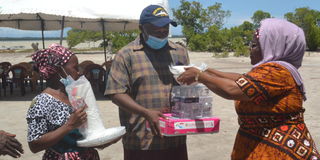Kilifi women group reaps from conservation project

One of the members of Bidii na Kazi women group receiving household items from National Museums of Kenya's underwater archeologist Ceasar Bita, and the Bidii na Kazi Women group matron Arafa Salim Baya during the ceremony to celebrate the fruits of mangrove conservation at Mida creek on April 17, 2021
A conservation women group in Kilifi has begun reaping from blue economy project at Mida Creek, after selling over 300,000 mangrove seedlings to support their livelihoods during the Covid-19 pandemic.
The Bidii na Kazi women group, which has 57 members, has now embarked on using part of its profits to purchase household items for its members undertaking mangrove conservation at Mida creek.
Speaking during the handing over of a complete set of household items to the first three women at Mida, the Bidii na Kazi women group matron Arafa Salim Baya said the initiative dubbed ‘wezesha mama nyumbani’ (empower a woman at home) is aimed at enabling the women rip fruits of conservation.
“The women have sold over 300,000 mangroves from their nursery established during the beginning of the Covid-19 pandemic, which enabled them get money for supporting each other transform their livelihoods,” she said adding “they purchased household items such as mattresses, pillowcases and kitchen items for their families.”
Ms Baya said the initiative was a clear indication that conservation work pays.
“Today we are reaping the fruits of conservation and when it gets to a time the community appreciates the efforts of conservation, we say it is a big mileage for us,’’ she added.
Ms Baya said the conservation of mangrove started a while back, but the turning point was in 2019, when President Uhuru Kenyatta launched the blue economy conference in Nairobi.
“Wezesha mama nyumbani are the benefits for conserving Mida creek. We have been depending on mangrove conservation for years, but in 2019 Kenya Forestry Research Institute (KEFRI) helped the women raise almost 200,000 mangrove seedlings for sale and from that we have been progressing,’’ she said.
Ms Baya said their aim is to ensure that the project helps the members at home, through furnishing and kitting the houses of its members, who have been undertaking the conservation project.
Ms Kavumbi Kaviha, a member of the women group said she never expected that she would ever directly benefit from conservation.
“Had I not been actively taking part in conservation, I wouldn’t be going home with these new facilities, ’she said after receiving the household items
Mr Ceaser Bita, an underwater archaeologist from the National Museums of Kenya (NMK), who has been training the women on how they can initiate income-generating projects from conservation, said he was happy to see them being empowered.
“The NMK helped them establish a restaurant at the mangrove forest, bee farming, canoe rides among other projects aimed at ensuring they benefit from the rich underwater heritage that exists at the creek,” he added.





